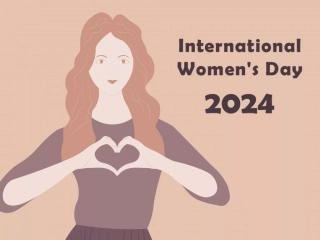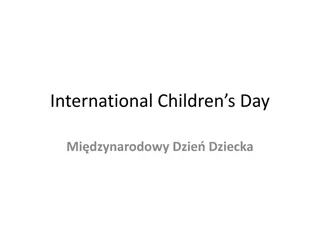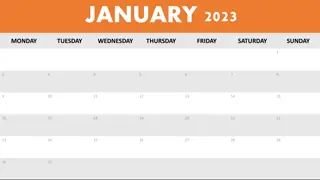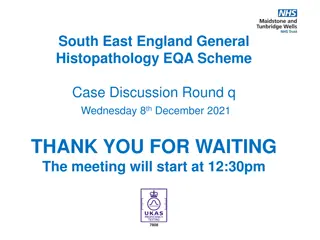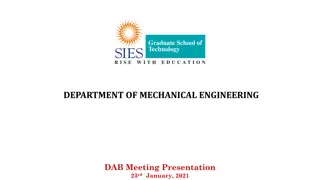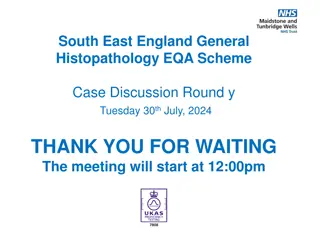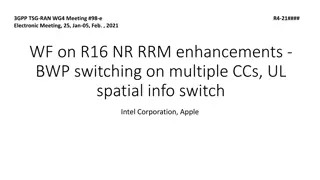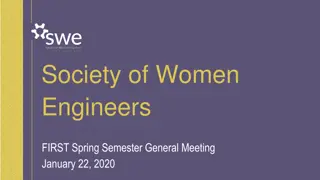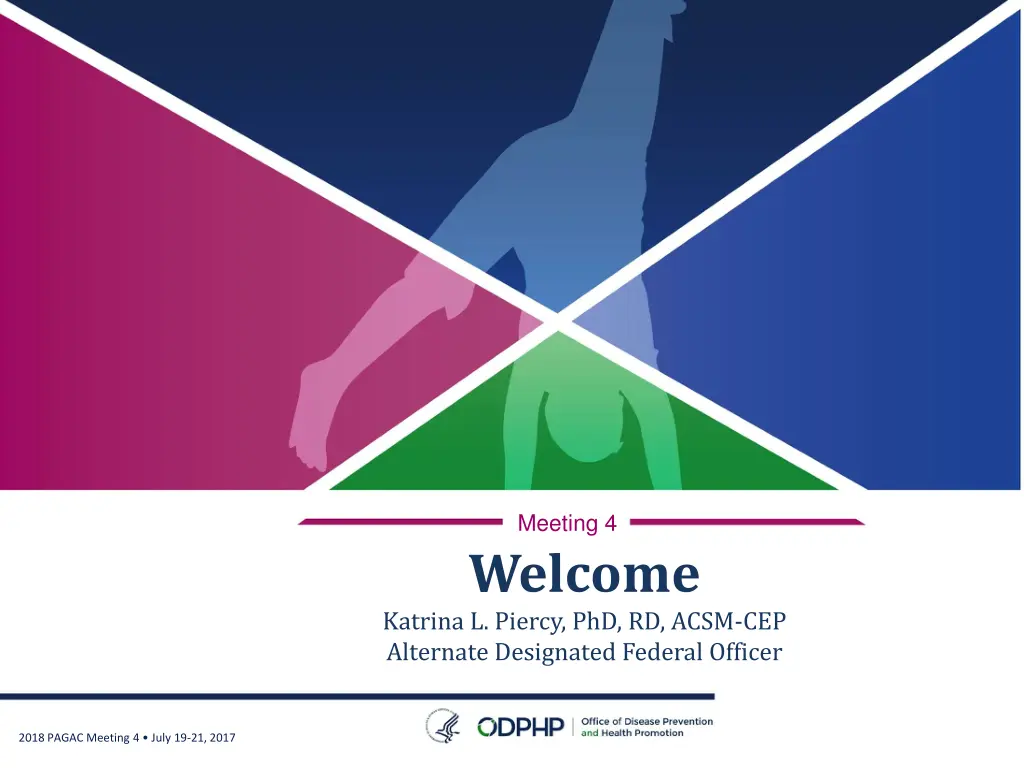
Physical Activity Guidelines Advisory Committee 2018 Meeting Insights
Explore the key highlights from the 2018 Physical Activity Guidelines Advisory Committee meeting, featuring expert members and consultants providing recommendations to the federal government. Learn about the upcoming release of the second edition of the Physical Activity Guidelines for Americans and how these guidelines aim to promote a healthier lifestyle for the American public.
Download Presentation

Please find below an Image/Link to download the presentation.
The content on the website is provided AS IS for your information and personal use only. It may not be sold, licensed, or shared on other websites without obtaining consent from the author. If you encounter any issues during the download, it is possible that the publisher has removed the file from their server.
You are allowed to download the files provided on this website for personal or commercial use, subject to the condition that they are used lawfully. All files are the property of their respective owners.
The content on the website is provided AS IS for your information and personal use only. It may not be sold, licensed, or shared on other websites without obtaining consent from the author.
E N D
Presentation Transcript
Meeting 4 Welcome Katrina L. Piercy, PhD, RD, ACSM-CEP Alternate Designated Federal Officer 2018 PAGAC Meeting 4 July 19-21, 2017
2018 Physical Activity Guidelines Advisory Committee Membership Abby C. King, PhD, Co-chair Stanford University School of Medicine Ken Powell, MD, MPH, FACSM, Co- chair Retired, CDC and Georgia Department of Human Resources David Buchner, MD, MPH, FACSM University of Illinois Wayne Campbell, PhD Purdue University Loretta DiPietro, PhD, MPH, FACSM George Washington University Kirk I. Erickson, PhD University of Pittsburgh Charles H. Hillman, PhD Northeastern University John M. Jakicic, PhD University of Pittsburgh Kathleen F. Janz, EdD, FACSM University of Iowa Peter T. Katzmarzyk, PhD Pennington Biomedical Research Center William E. Kraus, MD, FACSM Duke University Richard F. Macko, MD University of Maryland School of Medicine David Marquez, PhD, FACSM University of Illinois at Chicago Anne McTiernan, MD, PhD, FACSM Fred Hutchinson Cancer Research Center Russell R. Pate, PhD, FACSM University of South Carolina Linda Pescatello, PhD, FACSM University of Connecticut School of Medicine Melicia C. Whitt-Glover, PhD, FACSM Gramercy Research Group 2 2018 PAGAC Meeting 4 July 19-21, 2017
2018 Physical Activity Guidelines Advisory Committee Consultants Matthew P. Buman, PhD, FACSM Arizona State University William L. Haskell, PhD, FACSM Stanford University Virginia Byers Kraus, MD, PhD Duke University School of Medicine Melissa A. Napolitano, PhD The George Washington University David E. Conroy, PhD The Pennsylvania State University Steven J. Petruzzello, PhD, FACSM University of Illinois at Urbana-Champaign Ronald J. Sigal, MD, MPH University of Calgary Kelly Evenson, PhD, MS, FACSM University of North Carolina Chapel Hill Christine M. Friedenreich, PhD University of Calgary 3 2018 PAGAC Meeting 4 July 19-21, 2017
2018 PAG Advisory Committee Resources Advisory Committee Meeting Resources Written meeting summaries Archived webcasts and presentation slides Public Comment Database Read or submit public comments to the Advisory Committee health.gov/paguidelines 4 2018 PAGAC Meeting 4 July 19-21, 2017
Differentiating the Scientific Report and Guidelines Physical Activity Guidelines for Americans, second edition 2018 Physical Activity Guidelines Advisory Committee Scientific Report Recommendations of the Committee to the federal government based on its review of the scientific literature Physical activity recommendations of federal government to the American public Expected release in late 2018 Submitted to the HHS Secretary expected in early 2018 5 2018 PAGAC Meeting 4 July 19-21, 2017
Meeting Presentations Wednesday Afternoon 1-5 pm Thursday All Day 8-5 pm Friday Morning 8-11 am Cancer SC Exposure SC Pregnancy Working Group Chronic Conditions SC Brain Health SC Fitness Working Group Cardiometabolic Health and Weight Management SC Youth Transition Working Group Youth SC Pulling forward information from 2008 PAGAC/2008 PAG Sedentary Behavior SC Aging SC Physical Activity Promotion SC Integration chapter of the PAGAC Scientific Report 6 2018 PAGAC Meeting 4 July 19-21, 2017
Meeting 4 Introduction and Overview 2018 PAGAC Co-Chairs Abby King & Ken Powell 2018 PAGAC Meeting 4 July 19-21, 2017
Meeting 1 Overview Committee sworn in by the Acting Assistant Secretary for Health and read charge Presentations: History of the Guidelines Committee Operations Systematic Literature Review Process State of Physical Activity in America Subcommittee formation and membership 8 2018 PAGAC Meeting 4 July 19-21, 2017
Meeting 2 Overview Public comment Committee discussed: The spectrum of physical activity from sedentary behavior to high intensity activity Physical activity and physical fitness Musculoskeletal health Advantages & disadvantages of self-reported and device-based measurement of physical activity Overall systematic review question prioritization 9 2018 PAGAC Meeting 4 July 19-21, 2017
Meeting 3 Overview Subcommittee presentations on question 1 Draft conclusions and grades presented Full Committee discussion and deliberation Prioritization of next set of systematic review questions Presentation about setting physical activity targets by Dr. Bill Haskell (2008 PAGAC Chair) 10 2018 PAGAC Meeting 4 July 19-21, 2017
Meeting 4 Goals Subcommittee presentations on questions and Committee discussion and deliberation Presentations by working groups Fitness Pregnancy Youth transition Discussion of integration chapter Discussion of carrying forward information from 2008 PAGAC Scientific Report 11 2018 PAGAC Meeting 4 July 19-21, 2017
Overview for Subcommittee Presentations Updates on progress made with systematic review questions Each subcommittee has multiple questions in progress All conclusions, grades, etc. are in draft form Next slide shows grading criteria which all subcommittees are using to grade the evidence 12 2018 PAGAC Meeting 4 July 19-21, 2017
Grading the Evidence Adapted from 2015 Dietary Guidelines Advisory Committee Criteria Strong Moderate Limited Grade Not Assignable Study populations, exposures, and outcomes are directly related to the question Studied population, exposure, and outcomes are free from serious doubts about generalizability Some of the study populations, exposures, or outcomes, are directly related to the question Minor doubts about generalizability Most of study populations, exposures, and outcomes relate to the question indirectly Serious doubts about generalizability due to narrow or different study population, exposure, or outcomes studied All of the study populations, exposures, and outcomes relate to the question indirectly Highly unlikely that the studied population, exposure, and/or outcomes are generalizable to the US population Serious design flaws, bias, or execution problems across the body of evidence Applicability Generalizability (to the US population of interest) Studies are of strong design; free from methodological concerns, bias, and execution problems Many studies have been published and the results are highly consistent in direction and approximate size of effect. The magnitude and precision of the estimated effect provide considerable confidence in the accuracy of the findings. Studies are of strong design with minor methodological concerns OR studies of weaker study design A moderate number of studies have been published with some inconsistency in direction or size of effect. Studies of weak design OR inconclusive findings due to design flaws, bias, or execution problems Risk of bias/study limitations Few studies have been published with some inconsistency in direction or size of effect. Findings are too disparate to synthesize OR single small study unconfirmed by other studies Quantity & Consistency (of the results across the available studies) The magnitude and precision of the estimated effect provide confidence in the accuracy of the findings. The magnitude and precision of the estimated effect provide some but not a lot of confidence in the accuracy of the findings. Magnitude and precision of effect cannot be determined Magnitude and precision of effect 13 2018 PAGAC Meeting 4 July 19-21, 2017
Order of Presentations Wednesday afternoon Cancer-Primary Prevention SC Individuals with Chronic Conditions SC Youth SC Thursday all day Exposure SC Brain Health SC Cardiometabolic Health and Weight Management SC Sedentary Behavior SC Aging SC Promotion of Physical Activity SC Fridaymorning Pregnancy working group Fitness working group Young adult transition working group 14 2018 PAGAC Meeting 4 July 19-21, 2017
Next Steps Future meeting October 2017 Goal: Finalize questions and conclusions and approval by Committee of all subcommittee work Watch previous meetings (July 2016, October 2016, March 2017), download presentations, or read meeting summaries at https://health.gov/paguidelines/second- edition/meetings/ 15 2018 PAGAC Meeting 4 July 19-21, 2017


